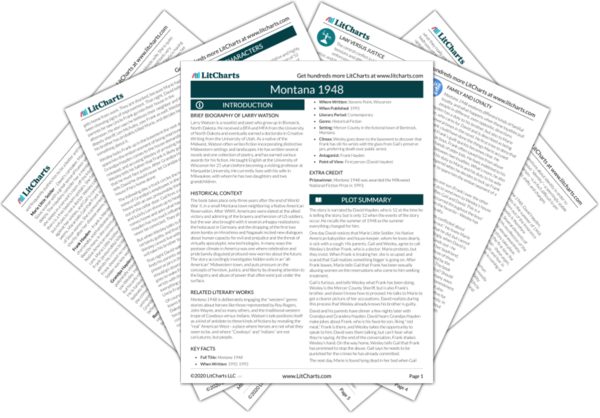Montana 1948 is a historical fiction about life in the “American West” shortly after the Second World War—it serves as an account of how racism affected individual lives in the specific time and place indicated by the book’s title. Bias against Native Americans in the Hayden’s community is fundamentally unquestioned. David, who narrates the story as he looks back from adulthood, comments that as a child, he never questioned certain biases, but now he can see them for what they really are. Marie must sleep in a small servant’s bedroom off the kitchen, even though there is a free bedroom upstairs. Ronnie Tall Bear, though a star athlete, does not go to college because he cannot get accepted as a Native American. Wesley, though he is Marie’s advocate, and (we are led to believe) a generally good man, dislikes Native Americans as a group, believing them to be lazy and dishonest, and their beliefs to be foolish and old fashioned. Frank, meanwhile, is blatantly racist—Wesley believes his brother thought less of Marie Little Soldier than of a dog. And Grandpa Julian is of the opinion that abuse of Native Americans is something that just happens—his biggest concern about his son Frank’s abusive behavior is that Frank will accidently end up with a non-white child.
In the novella, popular depictions of the American west—“Cowboys and Indians” as they appear in movies, television shows, and radio programs—are often held up against the realities of the town. David spends a great deal of time sifting through these images and trying to reconcile them with the world he actually lives in. His dad, “The Sheriff” is not nearly as exciting as a western cowboy and his job ends up not being about “defeating bad guys” but rather extremely morally complex. David’s caretaker, Marie Little Soldier, meanwhile, does not match stereotypes of “Indians” he sees in popular culture. Throughout the novel, Watson calls attention to one of the most forgotten and underplayed struggles in US history: that of Native American communities who want to maintain their culture, identities, and dignity in a United States that has systematically disenfranchised them and looks upon them with little more than prejudice.
Racism, Prejudice, and the American West ThemeTracker

Racism, Prejudice, and the American West Quotes in Montana 1948
The harshness of the land and the flattening effect of wind and sky probably accounted for the relative tranquility of Mercer County. Life was simply too hard…nothing was left over for raising hell or making trouble.
I never wondered then, as I do now, why a college didn’t snap up an athlete like Ronnie. Then, I knew, without being told, as if it were knowledge that I drank in the water, that college was not for Indians.
All of these accomplishments made Ollie the perfect choice for white people to point to as an example of what Indians could be.
I imagined all the Indians of our region, from town, ranches, or reservation, gathered on top of Circle Hill to do something about Marie’s death. But in my vision, the Indians were not lined up in battle formation as they always were in movies, that is, mounted on war ponies, streaked with war paint…Instead, just as I did in my daily life I saw them dressed in their jeans and cowboy boots, their cotton print dresses, or their flannel shirts.
“Screwing an Indian. Or feeling her up or whatever. You don’t lock up a man for that. You don’t lock up your brother. A respected man. A war hero.”
I find history endlessly amusing, knowing, as I do, that the record of any human community might omit stories of sexual abuse, murder, suicide.
















